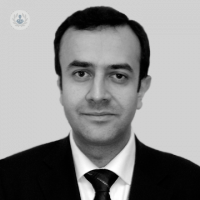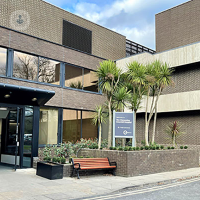What is a Fibroscan?
A Fibroscan is a test that allows the assessment of hepatic fibrosis as well as the quantification of liver fat. It is a non-invasive technique that is fast and reliable. It is particularly useful as an alternative to a biopsy.
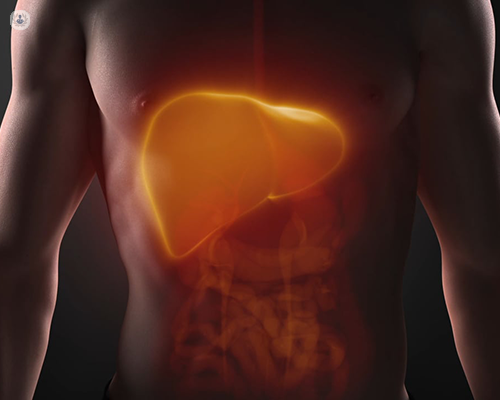
What are the advantages of a Fibroscan?
Regardless of the cause, diseases affecting the liver generally cause inflammation which destroys cells. After this, repair techniques naturally develop with a progressive accumulation of collagen fibre.
Knowing the degree of fibrosis is useful for diagnosing as well as monitoring and checking any disease progression. In the past, this was traditionally done by a liver biopsy. A biopsy involves removing a small sample of the liver to analyse it by puncturing the skin or via the intrahepatic (transjugular) veins.
Despite having been the most widely used technique, a liver biopsy has its drawbacks. The patient must be at the hospital for between 12 and 24 hours, and the assessment is not always easy to read as liver fibrosis distribution is vague and not homogenous.
Complications may arise from a liver biopsy. However, most of these potential complications are mild, with patients sometimes experiencing pain at the puncture site, pain around the liver area, or pain in the neck or shoulder. More serious complications may include haemorrhage, pneumothorax (collapsed lung), haemothorax, organ perferation, biliary peritonitis, and in very extreme but rare cases, death.
How should I prepare for a Fibroscan?
The patient should fast for two hours before the test. Once there, they lie down with their right arm raised and placed behind the neck. A transducer or probe is used to measure, and a gel is used on the surface. As it is a non-invasive test, the patient will not feel any discomfort. There are larger scanners available for obese patients. At least 10 measurements are made.
When is a Fibroscan recommended?
Fibroscan is quite commonly used in patients who have been diagnosed with or are being monitored for hepatitis C (HCV), chronic hepatitis due to hepatitis B (HBV), a combination of hepatitis C and HIV, alcoholic liver disease, hepatic steatosis (fatty liver) non-alcoholic, chronic cholestatic diseases, liver cirrhosis, and monitoring for pre and post-liver transplant patients.
What does a 'bad' result from a Fibroscan indicate?
Cases of non-alcoholic fatty liver disease and fatty liver are on the rise in the UK. An increase in the number of new cases is expected due to population diet changes and the increase in metabolic syndromes linked to obesity, high blood pressure, diabetes, and dyslipidaemia (increase in cholesterol and triglycerides).
As well as measuring fibrosis and the CAP (Controlled Attenuation Parameter), the Fibroscan is able to quantify liver fat content, which is crucial for early diagnosis. The test allows the physician to find out the stage of the liver fibrosis (hardness), from a mild stage to a more advanced stage (cirrhosis).
Which medical specialist performs a Fibroscan?
Fibroscan tests are largely performed by hepatologists and gastroenterologists.
10-05-2017 10-05-2017FibroScan
What is a Fibroscan?
A Fibroscan is a test that allows the assessment of hepatic fibrosis as well as the quantification of liver fat. It is a non-invasive technique that is fast and reliable. It is particularly useful as an alternative to a biopsy.

What are the advantages of a Fibroscan?
Regardless of the cause, diseases affecting the liver generally cause inflammation which destroys cells. After this, repair techniques naturally develop with a progressive accumulation of collagen fibre.
Knowing the degree of fibrosis is useful for diagnosing as well as monitoring and checking any disease progression. In the past, this was traditionally done by a liver biopsy. A biopsy involves removing a small sample of the liver to analyse it by puncturing the skin or via the intrahepatic (transjugular) veins.
Despite having been the most widely used technique, a liver biopsy has its drawbacks. The patient must be at the hospital for between 12 and 24 hours, and the assessment is not always easy to read as liver fibrosis distribution is vague and not homogenous.
Complications may arise from a liver biopsy. However, most of these potential complications are mild, with patients sometimes experiencing pain at the puncture site, pain around the liver area, or pain in the neck or shoulder. More serious complications may include haemorrhage, pneumothorax (collapsed lung), haemothorax, organ perferation, biliary peritonitis, and in very extreme but rare cases, death.
How should I prepare for a Fibroscan?
The patient should fast for two hours before the test. Once there, they lie down with their right arm raised and placed behind the neck. A transducer or probe is used to measure, and a gel is used on the surface. As it is a non-invasive test, the patient will not feel any discomfort. There are larger scanners available for obese patients. At least 10 measurements are made.
When is a Fibroscan recommended?
Fibroscan is quite commonly used in patients who have been diagnosed with or are being monitored for hepatitis C (HCV), chronic hepatitis due to hepatitis B (HBV), a combination of hepatitis C and HIV, alcoholic liver disease, hepatic steatosis (fatty liver) non-alcoholic, chronic cholestatic diseases, liver cirrhosis, and monitoring for pre and post-liver transplant patients.
What does a 'bad' result from a Fibroscan indicate?
Cases of non-alcoholic fatty liver disease and fatty liver are on the rise in the UK. An increase in the number of new cases is expected due to population diet changes and the increase in metabolic syndromes linked to obesity, high blood pressure, diabetes, and dyslipidaemia (increase in cholesterol and triglycerides).
As well as measuring fibrosis and the CAP (Controlled Attenuation Parameter), the Fibroscan is able to quantify liver fat content, which is crucial for early diagnosis. The test allows the physician to find out the stage of the liver fibrosis (hardness), from a mild stage to a more advanced stage (cirrhosis).
Which medical specialist performs a Fibroscan?
Fibroscan tests are largely performed by hepatologists and gastroenterologists.
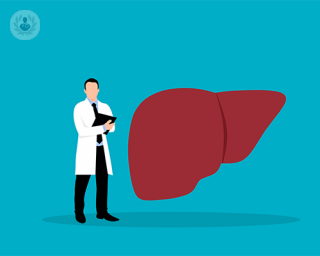

An expert's guide to Fibroscan
By Professor Aftab Ala
2024-11-21
Fibroscan is a modern technology used to evaluate liver health. In his latest article, renowned consultant gastroenterologist and hepatologist Professor Aftab Ala explains this new technology in detail. He explains the conditions it can detect, how it works and its advantages over a biopsy. See more


What is a FibroScan and why would I need one?
By Professor Kevin Peter Moore
2024-11-21
A fibroScan is a type of ultrasound which measures how much scarring there is in your liver due to liver disease. It is quick, painless and frequently obviates the need for a liver biopsy. See more
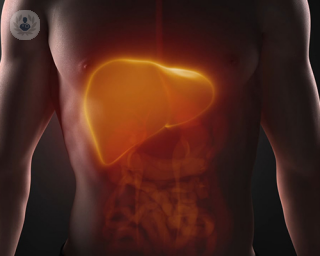

Why see a hepatologist (liver specialist)?
By Professor Kevin Peter Moore
2024-11-21
The liver is estimated to perform 500+ vital functions in the body. If your doctor suspects you may be having a problem with your liver, they may refer you to a specialist called a hepatologist. Professor Kevin Moore explains what a liver specialist does, & the kinds of patient he is able to see. See more
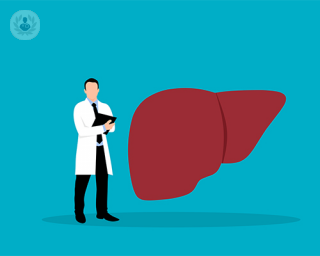

FibroScan FAQ: Your questions answered
By Professor Patrick Kennedy
2024-11-21
FibroScan is a tool used to offer instant insight into a patient’s liver health. In his latest online article, esteemed consultant hepatologist Professor Patrick Kennedy answers your most commonly asked questions about this new tool. See more
Experts in FibroScan
-
Professor Daniel Forton
GastroenterologyExpert in:
- Abdominal pain
- FibroScan
- Endoscopy
- Fatty liver
- Liver disease
- Viral hepatitis
-
Professor Aftab Ala
GastroenterologyExpert in:
- Liver function tests
- FibroScan
- Liver disease
- Colonoscopy
- Gastroscopy
- SIBO
-
Dr Jeremy Cobbold
Hepatology (liver specialist)Expert in:
- Liver disease
- FibroScan
- Fatty liver
- Abdominal pain
- Cirrhosis
-
Dr Matthew Foxton
Hepatology (liver specialist)Expert in:
- Fatty liver
- Liver function tests
- Viral hepatitis
- Endoscopy
- FibroScan
- Liver disease
-
Professor Shahid Khan
GastroenterologyExpert in:
- Liver function tests
- Abdominal pain
- Viral hepatitis
- Fatty liver
- FibroScan
- Endoscopy
- See all

The Lister Hospital - part of HCA Healthcare
The Lister Hospital - part of HCA Healthcare
Chelsea Bridge Road, London
No existe teléfono en el centro.
By using the telephone number provided by TOP DOCTORS, you automatically agree to let us use your phone number for statistical and commercial purposes. For further information, read our Privacy Policy
Top Doctors

The Clementine Churchill Hospital - part of Circle Health Group
The Clementine Churchill Hospital - part of Circle Health Group
Sudbury Hill, Harrow HA1 3RX
No existe teléfono en el centro.
By using the telephone number provided by TOP DOCTORS, you automatically agree to let us use your phone number for statistical and commercial purposes. For further information, read our Privacy Policy
Top Doctors

Private Care at Chelsea and Westminster Hospital
Private Care at Chelsea and Westminster Hospital
Chelsea and Westminster Hospital, 369 Fulham Rd.
No existe teléfono en el centro.
By using the telephone number provided by TOP DOCTORS, you automatically agree to let us use your phone number for statistical and commercial purposes. For further information, read our Privacy Policy
Top Doctors
-
The Lister Hospital - part of HCA Healthcare
Chelsea Bridge Road, London , Central LondonExpert in:
- Cancer
- Cardiology
- Orthopaedic surgery
- Pregnancy
- Physiotherapy
- Women’s health
-
The Clementine Churchill Hospital - part of Circle Health Group
Sudbury Hill, Harrow HA1 3RX, West LondonExpert in:
- Abdominal ultrasound
- Abdominoplasty
- Acne
- Allergies bronchopulmonary
- Allergies nose and ears
- Allergy Dermatitis
-
Private Care at Chelsea and Westminster Hospital
Chelsea and Westminster Hospital, 369 Fulham Rd., Central LondonExpert in:
- General Surgery
- Dermatology
- Paediatric Dermatology
- Paediatrics
- Preventive paediatrics
- Adult and paediatric services
- See all
- Most viewed diseases, medical tests, and treatments
- Nutrition
- Abdominal pain
- Anxiety
- Stress
- Digestive diseases
- Intestinal pseudo-obstruction
- Hirschsprung's disease
- Anorectal malformation
- Obstructed defecation syndrome
- Colectomy
